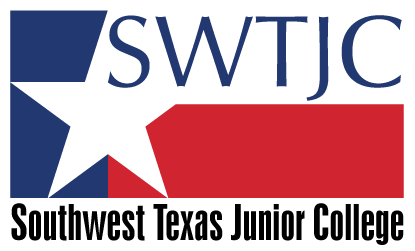4.9 Definition of Credit Hours
The institution has policies and procedures for determining the credit hours awarded for courses and programs that conform to commonly accepted practices in higher education and to Commission policy. (See Commission policy “Credit Hours.”).
JUDGMENT: ![]() Compliant
Compliant
STATEMENT OF RATIONALE FOR JUDGMENT OF COMPLIANCE
Southwest Texas Junior College (SWTJC) follows national and State accepted practices of awarding credit based on semester credit hours. SWTJC utilizes the definition of semester credit hours found in the Texas Higher Education Coordinating Board (THECB) Lower Division Academic Course Guide (ACGM) manual:
A traditional course offered for 48 contact hours of lecture over a 16-week semester will earn three semester credit hours […] Similarly, a traditional lecture/lab course offered for 48 contact hours of lecture and 32 contact hours of laboratory over a 16-week semester would earn four semester credit hours […] In general, one semester credit hour is awarded per 16 contact hours of lecture instruction and one semester credit hour is awarded per 32 to 48 contact hours of laboratory instruction. (p. 3)
This definition is based upon the Federal definition of the Credit Hour, which states: “a credit hour is an amount of work represented in intended learning outcomes and verified by evidence of student achievement that is an institutionally established equivalency that reasonably approximates:
1. Not less than one hour of classroom or direct faculty instruction and a minimum of two hours out of class student work each week for approximately fifteen weeks for one semester or trimester hour of credit, or ten to twelve weeks for one quarter hour of credit, or the equivalent amount of work over a different amount of time, or
2. At least an equivalent amount of work as required outlined in item 1 above for other academic activities as established by the institution including laboratory work, internships, practica, studio work, and other academic work leading to the award of credit hours.” (SACSCOC Policy Statement “Credit Hours”)
Southwest Texas Junior College offers credit for Degrees and Certificates only on a semester credit hour basis.
All courses offered by SWTJC for Degree or Certificate credit are authorized by the State of Texas in the ACGM (for academic courses, please see link above) or the Workforce Education Course Manual (vocational/technical courses). Both Manuals list eligible courses, provide course descriptions or expected outcomes, and delimit the number of semester credit hours that may be awarded for each course or laboratory. SWTJC may only offer courses for credit which are listed in those documents.
The SWTJC Curriculum Committee has an established process for approval of new courses, course modification, program modification, and new program proposals. Required documentation and its review assure that courses and programs provide the appropriate amount and level of credit.
Distance Education
Consistent practices for awarding credit are followed at SWTJC, regardless of course delivery method. All courses offered by SWTJC, whether via face-to-face classes, video conferencing, online, or hybrid, adhere to the same established practices. All courses, regardless of delivery mode, must use a syllabus derived from a Master Syllabus, which has been developed by discipline faculty. Among the standard elements of a course syllabus is the semester credit value of the course.
Southwest Texas Junior College provides all instruction for course work necessary for all degrees and certificates. Course requirements are recorded in the Catalog and course offerings are published each semester in the course schedule. Both documents are available on the College website.
On occasion, a student may choose an elective course for which SWTJC does not provide instruction. In those cases, the student may arrange to take the course through the Virtual College of Texas (VCT). The VCT is a State-wide consortium of two-year colleges designed to allow “Host” institutions to transcript courses offered by “Provider” institutions. Students are actually enrolled in “Host” colleges, which are responsible for the quality of instruction and providing all related services.
For example, at this writing SWTJC is not able to offer Physics, which a student may wish to take as an elective or to satisfy a Science requirement. In this event SWTJC, as the “Host” college, contracts with a VCT “Provider” college to make the course available to the student online. The SWTJC Vice President of Academic Affairs confirms the unavailability of the course at SWTJC, reviews the credentials of the “Provider” college’s assigned faculty member, validates the accuracy of the “Provider” course number and title, reviews the course syllabus, and allows or disallows the course via SWTJC documentation. This process is followed for all student requests to enroll in a VCT course.
In a 2007 Memorandum from SACSCOC President, Dr. Belle Wheelan, SWTJC was confirmed as an approved institution to participate in the Virtual College of Texas.
Evidence
Academic Course Guide Manual
Southern Association of Colleges and Schools Commission on Colleges, Credit Hours
SWTJC Catalog, 2014-2016, pp. 105-110
Workforce Education Course Manual
SWTJC Faculty Handbook, 2014, p. 120
SWTJC Curriculum Submission Form
SWTJC Faculty Handbook, 2014, pp. 53-55
SWTJC Master Template
SWTJC Catalog, 2014-2016, pp. 107-110
SWTJC Fall Schedule 2014
SWTJC Website Catalog
SWTJC Website Virtual College of Texas (VCT)
Southern Association of Colleges and Schools Commission on Colleges, Memorandum


